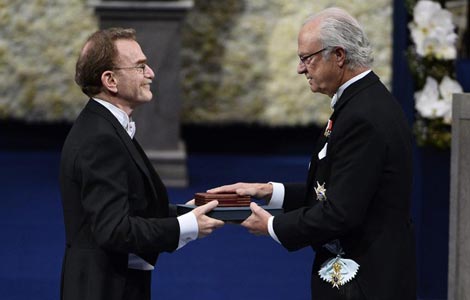Internet can 'help curb corruption'
Updated: 2013-12-10 23:55
By Hou Liqiang (China Daily)
|
||||||||
Revelations on the Internet about the misconduct of a government official can help anti-corruption efforts, provided that those who publish the information avoid improper invasions of privacy and do not fabricate information, said an expert in governance.
"The discipline watchdog is sometimes not enough to crack down on corruption. Public participation is needed," said Yang Xiaojun, a professor at the Chinese Academy of Governance.
The matter arose after a senior judge in Hubei province was suspended following the posting of a video clip on the Internet that showed a man checking into a hotel with a woman on Oct 14. He later left the hotel alone.
The man was identified in a separate Internet posting as the "president of Hubei provincial court".
The posting appeared on the Internet on Sunday, and an official investigation was confirmed on Monday.
Zhang Jun, head of the third division of criminal cases of the Hubei High People’s Court, is being investigated and will be removed permanently from his post if authorities conclude there is sufficient cause and approve the action, the court said in an online statement.
The first response from the court came early on Monday, when it said that the man was not the president or vice-president of the court. Later, at about 10:30 pm, the court confirmed Zhang’s identity and announced his suspension.
"Zhang maintained a long-term extramarital relationship with a woman from another organization," the court said.
The case raises again the question of the role of the Internet in anti-corruption efforts.
Zhu Lijia, also a professor at the Chinese Academy of Governance, said the public should wait to see if Zhang abused his power or gained personal profit through his relationship with the woman.
"If not, the case is more about morality than corruption," Zhu said.
He said that local discipline officials should collect more information about Zhang, both past and present, and conduct a careful investigation to see if he has violated rules or laws.
Yang said that this case, aside from what the final outcome might be, illustrates the efficiency of the Internet in identifying misbehavior.
Internet efforts not only make the misconduct of some individual officials public but also bring related government bodies under scrutiny, which makes the process of cracking down on corruption more transparent, Yang said.
But Yang also warned that Internet publicity could also constitute an invasion of people’s privacy if a behavior has no connection to public duties.
Liu Kun in Wuhan
contributed to this story.

 2013 Nobel Prize award ceremony in Stockholm
2013 Nobel Prize award ceremony in Stockholm
 Reuters images of the year - politics
Reuters images of the year - politics
 Conjoined babies waiting for surgery
Conjoined babies waiting for surgery
 Chinese say their goodbyes
Chinese say their goodbyes
 Obama shakes hands with Cuban president Castro
Obama shakes hands with Cuban president Castro
 S Africa holds memorial service for Mandela
S Africa holds memorial service for Mandela
 World Cup mascot makes China debut
World Cup mascot makes China debut
 Catering to Chinese viewers a hurdle for Hollywood
Catering to Chinese viewers a hurdle for Hollywood
Most Viewed
Editor's Picks

|

|

|

|

|

|
Today's Top News
Retirees saddled with kids' costs
Bar lowered for private pilots
Building impact reports will be released
Obama urges Congress to pass budget deal
Beijing announces theme, priorities of APEC
Battle against counterfeit goods enters a new phase
Chinese say their goodbyes to Mandela
Conference maps path for 2014
US Weekly

|

|







